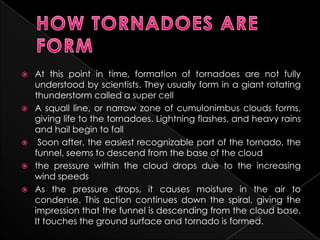Tornado
- 5. ’é× What is tornado and water spouts ’é× Characteristic ’é× World tornado affecting zone in map ’é× How its form ’é× Classification ’é× Why tornadoes are so destructive ’é× Effect ’é× Recent tornadoes
- 6. ’é× Is derived from Spanish word ŌĆ£TORNADOŌĆØ which comes from ŌĆ£tronarŌĆØ which means ŌĆ£to thunderŌĆØ ’é× Tornadoes are funnel shaped storms where in the upper portion is like an umbrella in shape while lower portion is like pipe which touches the surface ’é× According to ŌĆ£the national oceanic and atmospheric administrationŌĆØ-a tornado is violently rotating column of air along the ground Fig: Tornado
- 7. ’é× A water spout is less intense and causes far less damage. It forms over warm tropical ocean waters although its funnel is made of fresh water Fig : water spouts
- 8. ’é× Most violence of all the storms. ’é× It moves with average speed of 40-60km ’é× Follow very narrow path ’é× Average duration is 15-20min
- 10. ’é× At this point in time, formation of tornadoes are not fully understood by scientists. They usually form in a giant rotating thunderstorm called a super cell ’é× A squall line, or narrow zone of cumulonimbus clouds forms, giving life to the tornadoes. Lightning flashes, and heavy rains and hail begin to fall ’é× Soon after, the easiest recognizable part of the tornado, the funnel, seems to descend from the base of the cloud ’é× the pressure within the cloud drops due to the increasing wind speeds ’é× As the pressure drops, it causes moisture in the air to condense. This action continues down the spiral, giving the impression that the funnel is descending from the cloud base. It touches the ground surface and tornado is formed.
- 12. PEARSON PATH PEARSON PATH CLASS(SCALE) FUJITA WIND SPEED LENGTH WIDTH - 0 to 40 mph less than 0.3 miles Less than 6 yards 0 40 to 72 mph 0.3 to 0.9 miles 6 to 17 yards 1 73 to 112 mph 1.0 to 3.1 miles 18 to 55 yards 2 113 to 157 mph 3.2 to 9.9 miles 56 to 175 3 158 to 206 mph 10 to 31 miles 176 to 566 yards 4 207 to 260 mph 32 to 99 miles 0.3 to 0.9 miles 5 261 to 318 mph 100 to 315 miles 1.0 to 3.1 miles
- 13. ’é× Sudden decrease of air pressure. ’é× Air is rotated very rapidly. ’é× The power of rising
- 14. ’é× Ecological balance may be hampered ’é× Destroys everything on its way ’é× Heavy loss of human and animal life ’é× Burst out the building ’é× Damage of communication
- 16. Rank Name(location) Country Date Death 1 Daultipur and Bangladesh 26th april,1989 1300 Salturia East Pakistan 1969 East Pakistan 2 ,Pakistan (now 14th april,1969 923 Tornado Bangladesh) 3 Tri-State US 18th march1925 695 Manikganj, Singair 4 Bangladesh 17th april,1973 681 and Nawabganj Magura and Narail 5 Bangladesh 11th march,1964 500 Districts Madaripur and 6 Bangladesh 1st april,1977 500 Shibchar Belyanitsky, Ivanov 7 Russia 9th june,1984 400 o and Balino North of Cooch India, 8 Behar and 19th april,1963 300 Bangladesh surrounding area Bhakua and 9 Bangladesh 29th april,1972 300 Haripur unions
- 17. ’é× NATIONAL GEOGRAPHY ’é× WIKIPEDIA ’é× CLIMATOLOGY-Savindra singh ’é× JOLOBAIU BIDDA-Arif & Kabir



















